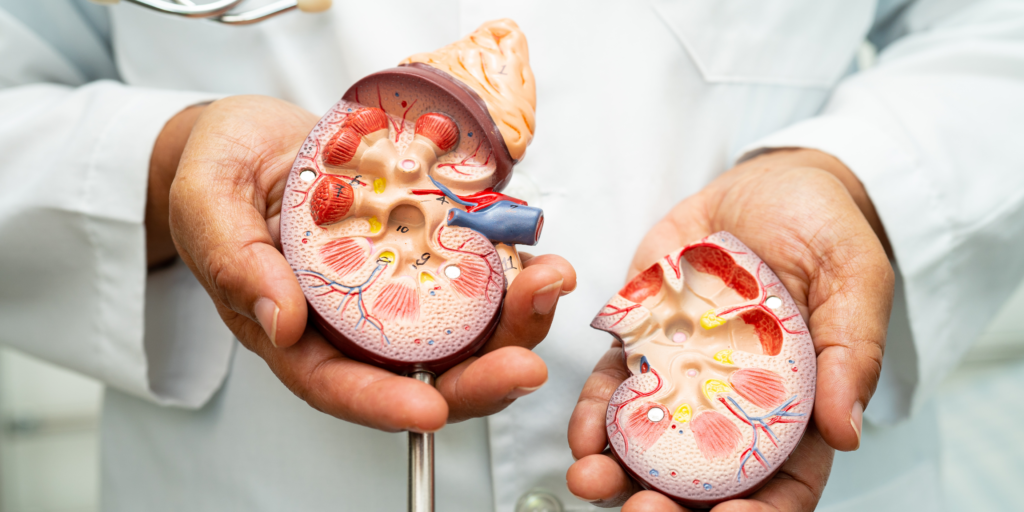Renal Biopsy
- +91 90537-79477
- nephrons2024@gmail.com
- Near Tinkoni, GT Road, Bathinda

Renal Biopsy
A renal biopsy is a minimally invasive procedure used to diagnose and evaluate kidney disease. Here’s a breakdown of the disease and the role of a renal biopsy:
Understanding Kidney Disease
The kidneys are two bean-shaped organs responsible for filtering waste products, excess fluid, and electrolytes from the blood. They also play a crucial role in maintaining blood pressure, red blood cell production, and overall body balance.
There are many different types of kidney disease, each with varying causes and symptoms. Some common examples include:
- Glomerulonephritis: Inflammation of the tiny filters within the kidneys called glomeruli.
- Diabetic nephropathy: Kidney damage caused by diabetes.
- Polycystic kidney disease (PKD): A genetic disorder characterized by the growth of cysts in the kidneys.
- Lupus nephritis: Kidney damage caused by the autoimmune disease lupus.
Why Perform a Renal Biopsy?
A renal biopsy is not a routine test. It’s typically performed when other diagnostic tests, such as blood and urine tests, imaging studies (ultrasound, CT scan, MRI), or physical examination findings, are inconclusive or suggestive of kidney disease but don’t pinpoint the specific cause.
Here are some reasons why a nephrologist might recommend a renal biopsy:
Unexplained Decrease in Kidney Function
When there is a noticeable drop in your kidney function, as revealed by blood tests, and the reason for this decline remains unclear, a kidney biopsy can help determine the underlying cause. This could involve a sudden or gradual decrease in kidney function.
Blood in the Urine (Hematuria)
The presence of blood in your urine, known as hematuria, can be a sign of potential kidney damage. A kidney biopsy can help pinpoint the exact cause of the blood in your urine, which is crucial for determining the appropriate treatment.
Protein in the Urine (Proteinuria)
Excessive amounts of protein in your urine, referred to as proteinuria, can indicate kidney problems. A kidney biopsy can help identify the specific type of kidney disease causing the proteinuria and assess the severity of the condition.
Rapidly Progressive Kidney Disease
When your kidney function deteriorates rapidly, a kidney biopsy becomes essential to determine the underlying cause of the rapid decline. This information is vital for selecting the most effective treatment to slow or halt the progression of the kidney disease.
Evaluating Kidney Transplant Rejection
After receiving a kidney transplant, a biopsy can be used to assess the health of the transplanted kidney and detect any signs of rejection. Early detection of rejection is crucial for preventing graft loss and ensuring the long-term success of the transplant.
The Renal Biopsy Procedure
The renal biopsy is typically performed as an outpatient procedure. Here’s a general overview of what to expect:
- Preparation: You may be asked to stop taking certain medications beforehand.
- Anesthesia: Local anesthesia is used to numb the area around the kidney, and sometimes light sedation is provided for comfort.
- Biopsy Technique: There are two main techniques for obtaining a tissue sample:
- Percutaneous biopsy: A thin needle is inserted through the skin and guided by ultrasound or X-ray to reach the kidney. The needle then collects a small sample of tissue.
- Surgical biopsy: In rare cases, a small surgical incision may be made in the back to access the kidney directly and obtain a tissue sample.
- Recovery: Following the procedure, you will be monitored for a few hours to ensure there are no complications. Most people can go home the same day.
Renal Biopsy Results
The results of your kidney biopsy are crucial for your treatment plan. They help your nephrologist:
- Accurately diagnose your kidney condition: The biopsy can identify the specific type of kidney disease you have, which is essential for effective treatment.
- Assess the severity of your kidney disease: The biopsy can help determine how advanced your kidney disease is and how quickly it’s progressing.
- Guide treatment decisions: Based on the biopsy results, your nephrologist can develop a personalized treatment plan tailored to your specific condition. This might include medications, lifestyle changes, or other therapies.
- Monitor the effectiveness of treatment: Biopsies can be repeated to track the progress of your kidney disease and evaluate how well your treatment is working.
Potential Risks and Complications
While a kidney biopsy is generally considered a safe procedure, it’s important to be aware of the potential risks. These risks are relatively low, but it’s essential to discuss them with your nephrologist before undergoing the procedure.
- Bleeding: There’s a small chance of bleeding at the biopsy site. Your doctor will take precautions to minimize this risk, and bleeding usually stops on its own.
- Infection: There’s a slight possibility of infection at the biopsy site. To reduce this risk, you will be given antibiotics before the procedure.
- Damage to nearby organs: In rare cases, the biopsy needle may accidentally damage nearby organs, such as the intestines or colon. However, this is uncommon and usually doesn’t cause serious problems.
When to See a Nephrologist:
If you experience any symptoms associated with kidney disease, consulting a nephrologist is essential. Early detection and diagnosis are crucial for effective management.
Enhance your kidney health expert treatment by the best nephrologist in Bathinda. Book a session or contact Us on WhatsApp now!